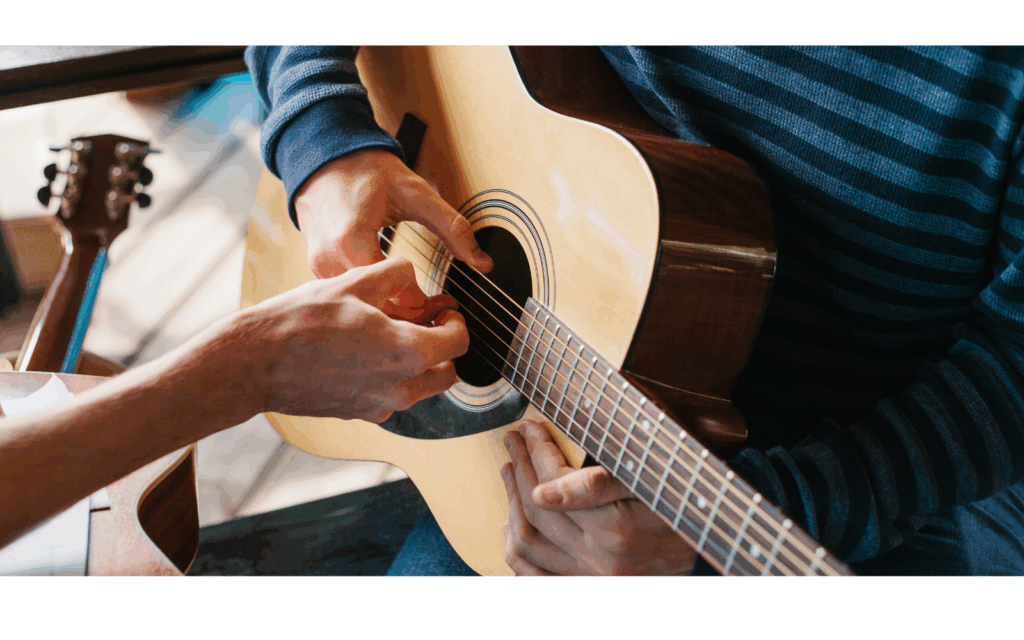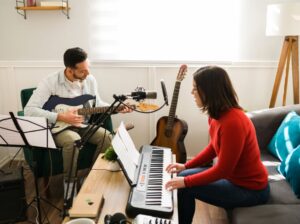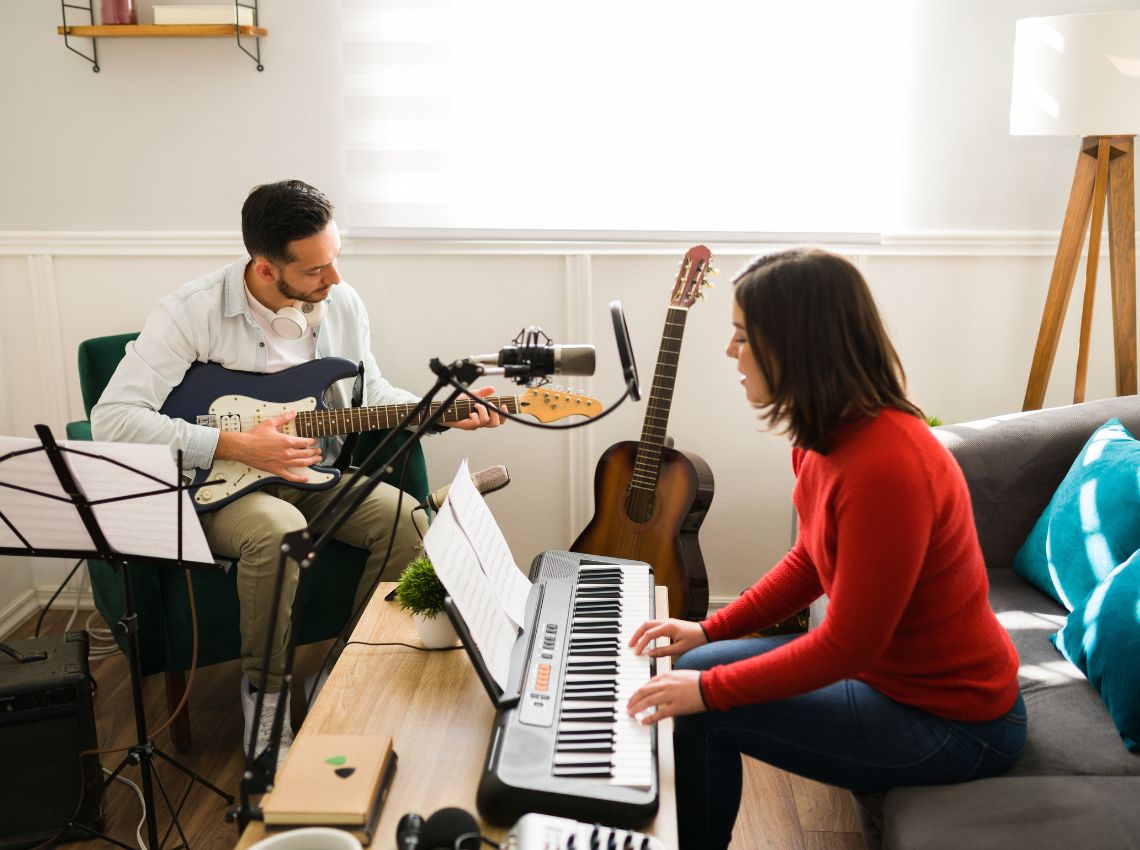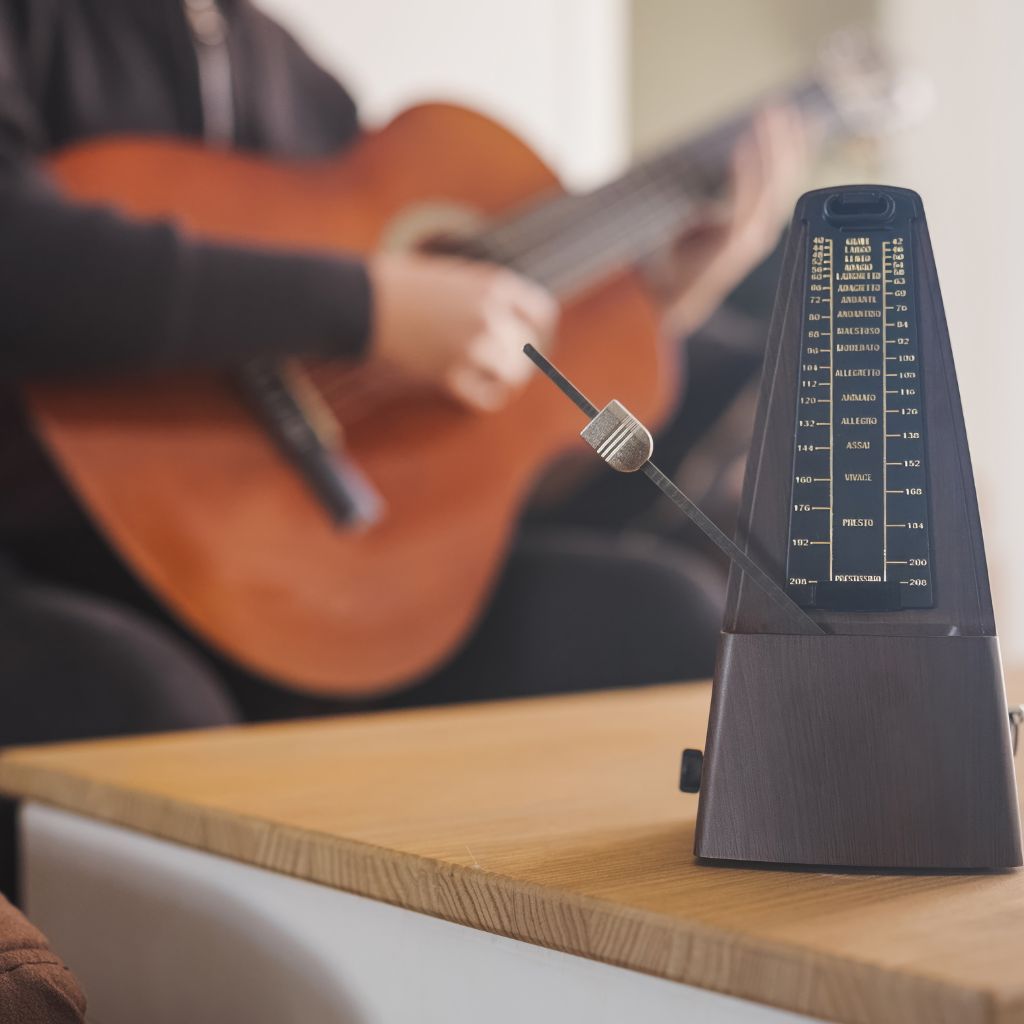Neurologic Music Therapy
in Neurorehabilitation
By tapping into the brain’s natural response to music, Neurologic Music Therapy (NMT) can help improve speech and language, motor, and cognitive skills impacted by neurological conditions or brain injuries.

Music as a clinical tool to rebuild skills
Neurologic Music Therapy (NMT) uses the power of rhythm and sound to help the brain heal, adapt, and grow after injury or illness.
Whether recovering from a stroke, managing Parkinson’s, rebuilding after a traumatic brain injury, or facing movement and communication challenges from neurological conditions, our board-certified music therapists work hand-in-hand with clients and their medical teams. Every session is grounded in neuroscience and personalized to support motor recovery, speech and language development, and cognitive functioning. No music experience is needed.
With proven techniques backed by research, we help clients walk again with better gait, regain speech, improve memory, and reconnect with life. We don’t just play music — we target brain function.
Music therapy is more than just making music — it’s a research-based and compassionate approach to growth. At OC Music Services, we offer music therapy for neurological conditions, all within a safe, creative, and empowering environment.
You’re not alone in this journey. Let us walk alongside you and you the tools, encouragement, and environment to thrive.
Treatment Areas
We work with individuals of all ages—from children to teens to adults. Each session is personalized to fit the client’s age, interests, and needs.
Speech and Language
Sensorimotor
Cognition
Music and language utilize the shared neural pathways as speech and language. Singing, rhythmic cues, vocal intonation therapy (VIT) can improve skills such as breath control, word retrieval, fluency, articulation, and non-verbal communication.
Music primes the motor system, providing anticipatory times cues for movement planning and execution. Gait training, fine and gross motor movements can be treated using auditory rhythm and instrument playing and placement to improve endurance, strength, balance, range of motion, coordination, and dexterity.
Music provides stimulation and organization to the brain enhancing cognitive skills such as attention, memory, spatial neglect, executive functioning, auditory perception, and arousal.
Learn about goal areas, techniques, and examples for each treatment area
*Click Tabs Below
The goal is to improve speech production, fluency, and language comprehension through rhythmic and melodic music interventions that stimulate the brain’s speech and language centers.
Common techniques:
MIT (Melodic Intonation Therapy): Uses melody and rhythm to facilitate speech in those with expressive language impairments.
- TS (Therapeutic Singing): Involves use of singing to facilitate initiation, development, and articulation in speech and language as well as to increase functions of the respiratory apparatus.
RAS (Rhythmic Auditory Stimulation): Supports breath pacing and fluency.
Who’s it for:
Individuals recovering from stroke or brain injury
Adults with aphasia, apraxia, or dysarthria
Children with neurological speech delays
Session Format:
In-person or online
Individual or small group
The goal is to enhance coordination, gait, posture, and fine/gross motor skills using rhythm and structured music-based movement.
Common techniques:
- RAS (Rhythmic Auditory Stimulation): Improves gait training and movement synchronization.
- TIMP (Therapeutic Instrumental Music Performance): Uses musical instruments to target motor control, strength, and coordination.
- Patterned Sensory Enhancement (PSE): Uses musical elements to cue and support functional movements like reaching, lifting, or balance.
Who’s it for:
- Individuals with Parkinson’s disease, MS, TBI, or stroke
- Children with cerebral palsy or developmental motor delays
- Anyone recovering from neurological injury affecting movement
Session Format:
In-person preferred for physical movement support
Individual or small group (e.g., Parkinson’s movement groups)
The goal is to stimulate attention, memory, executive function, and emotional regulation to support daily functioning and quality of life.
Common techniques:
Musical Attention Control Training (MACT): Improves sustained, selective, and alternating attention.
Musical Mnemonics Training (MMT): Uses music to reinforce memory and recall (e.g., names, routines).
Executive Function Training: Structured improvisation or music tasks targeting planning, sequencing, or problem solving.
Who’s it for:
Adults with dementia, Alzheimer’s disease, or cognitive decline
Individuals recovering from brain injury
Children and teens with executive function challenges related to neurodevelopmental conditions
Session Format:
In-person or online
Individual or small group (e.g., Memory Care Groups)
Here’s how to get started:
Contact us using the form below or call (949) 591-3875
Schedule an assessment
Meet your therapist and begin your journey!

Progress may not be linear, but with the right rhythm, it becomes possible.
FAQs
Do I need a referral to start?
No referral is needed. You can contact us directly to schedule an assessment. We welcome collaboration with physicians, physical therapists, occupational therapists, and speech-language pathologists to align care goals.
Is NMT covered by insurance?
Coverage varies by provider and plan. While NMT may not be covered under traditional insurance, some clients use health savings accounts (HSAs), private pay, or receive funding through disability programs or grants. We also partner with centers to bring NMT programs to a facility near you.
How can our rehab center incorporate NMT services?
NMT can be integrated into your existing treatment model by contracting with a board-certified music therapist with Neurologic Music Therapy certification. Services can be offered individually or in groups, depending on patient needs.
Where are sessions?
Sessions are offered in-person at our Irvine studio, in clinics and other healthcare facilities, or online via secure telehealth, depending on what’s most comfortable and accessible for you. Both options are designed to provide a supportive, engaging, and private environment.
Let's Get Started

Who We Work With: Aphasia, Apraxia, Dysarthria, Voice Disorders, Stroke, Brain Injury, Parkinson’s Disease, Spinal Cord Injury, Multiple Sclerosis, Cerebral Palsy, Alzheimer’s Disease, Dementia, Functional Neurologic Disorder, Autism. Coma Recovery



